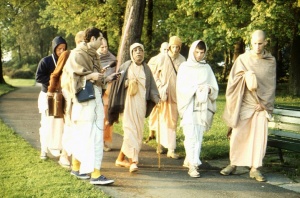CC Adi 6.68 (1975)

A.C. Bhaktivedanta Swami Prabhupada
Below is the 1996 edition text, ready to be substituted with the 1975 one using the compile form.
TEXT 68
- api bata madhu-puryām ārya-putro ’dhunāste
- smarati sa pitṛ-gehān saumya bandhūṁś ca gopān
- kvacid api sa kathāṁ naḥ kiṅkariṇāṁ gṛṇīte
- bhujam aguru-sugandhaṁ mūrdhny adhāsyat kadā nu
SYNONYMS
api—certainly; bata—regrettable; madhu-puryām—in the city of Mathurā; ārya-putraḥ—the son of Nanda Mahārāja; adhunā—now; āste—resides; smarati—remembers; saḥ—He; pitṛ-gehān—the household affairs of His father; saumya—O great soul (Uddhava); bandhūn—His many friends; ca—and; gopān—the cowherd boys; kvacit—sometimes; api—or; saḥ—He; kathām—talks; naḥ—of us; kiṅkarīṇām—of the maidservants; gṛṇīte—relates; bhujam—hand; aguru-su-gandham—having the fragrance of aguru; mūrdhni—on the head; adhāsyat—will keep; kadā—when; nu—may be.
TRANSLATION
“O Uddhava! It is indeed regrettable that Kṛṣṇa resides in Mathurā. Does He remember His father’s household affairs and His friends, the cowherd boys? O great soul! Does He ever talk about us, His maidservants? When will He lay on our heads His aguru-scented hand?”
PURPORT
This verse appears in Śrīmad-Bhāgavatam (SB 10.47.21), in the section known as the Bhramara-gītā. When Uddhava came to Vṛndāvana, Śrīmatī Rādhārāṇī, in complete separation from Kṛṣṇa, sang like this.